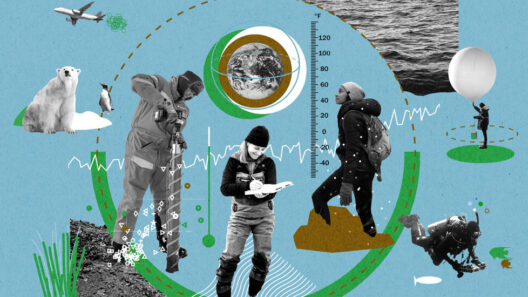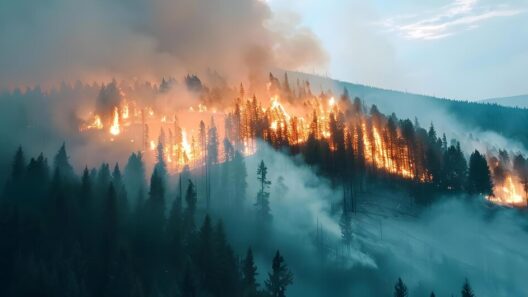The phenomenon of global warming unfurls like an insatiable beast, gnawing at the threads of human existence. As temperatures rise and ecosystems buckle under pressure, the implications for human health loom large. The intricate web of life on Earth has begun to unravel, with climate change as the harbinger of myriad health challenges, both immediate and insidious.
First, let us consider the relentless march of heatwaves, those sweltering surges of summer that sear our landscapes and test our mettle. Prolonged exposure to elevated temperatures is not just uncomfortable; it poses acute risks to human health. Heat-related illnesses, such as heat exhaustion and heatstroke, can quickly escalate, overwhelming even the sturdiest among us. Vulnerable populations, including the elderly, children, and those with pre-existing health conditions, find themselves particularly exposed. Furthermore, as the intensity of heat events increases, so too does the potential for roadblocks to essential services and healthcare, exacerbating existing health disparities.
Moreover, the surging temperatures pave the way for a dizzying array of pathogens, like uninvited guests at a banquet. Scientists reveal a clear connection between climate change and the proliferation of infectious diseases; the warmer climates create hospitable environments for disease vectors such as mosquitoes and ticks. Diseases like malaria, dengue fever, and Lyme disease, once confined to certain geographies, are steadily emboldened to venture into new territories, endangering populations unaccustomed to their presence. Public health systems, straining under these added pressures, face a Sisyphean task of combating diseases that are no longer tethered by traditional boundaries.
Air quality, that invisible breath we often take for granted, undergoes a precarious transformation as global warming intensifies. Elevated temperatures exacerbate the formation of ground-level ozone, a noxious byproduct of industrial emissions and vehicle exhaust. As the air becomes thick with pollutants, respiratory ailments such as asthma and bronchitis surge, creating a public health crisis that disproportionately affects urban centers and marginalized communities. Children, in particular, bear the brunt of this—exposed to poor air quality during critical developmental years, their lungs may be stunted irreparably.
The perturbation of climate also reverberates through our agricultural systems, influencing the very sustenance that supports human life. Crop yields are scarred by fluctuating precipitation patterns and unpredictable weather events. Droughts, floods, and rising pest populations wreak havoc on food supply chains, leading to heightened food insecurity. Malnutrition is not merely a consequence of inadequate access to food; it is intricately tied to the climate crisis. As the nutritional quality of food diminishes, particularly in staple crops, populations around the globe face the haunting specter of failing health, malnourishment, and the long-term consequences that follow.
In many ways, our mental and emotional well-being mirrors the physical strains inflicted by climate change. The psychological toll of global warming is profound; the anxiety, grief, and stress associated with extreme weather events, loss of livelihoods, and ecological degradation give rise to a myriad of mental health disorders. Communities ravaged by climate-related disasters experience a phenomenon known as “eco-anxiety”—a chronic fear of environmental doom that can paralyze individuals and destabilize communities. Collectively grappling with such despair, society finds itself in a paradoxical struggle: individually striving for resilience while confronting a shared and escalating threat.
But amidst this dark reality, glimmers of hope and agency emerge. The narrative of global warming is not singularly dire; it is intertwined with our capacity for resilience and adaptation. Communities across the globe are mobilizing, forming coalitions to combat climate change at local and national levels. Awareness and education are paramount; as individuals become cognizant of the health impacts linked to climate change, vigilance and advocacy can take root. This metamorphosis transforms apathy into action, illuminating pathways toward sustainable practices that bolster both human well-being and environmental integrity.
In this web of interconnections, it is imperative to recognize that each action reverberates beyond the personal sphere. Engaging in sustainable practices—reducing carbon footprints, supporting renewable energy initiatives, and fostering biodiversity—becomes an act of global solidarity. When individuals choose to advocate for environmental policies that prioritize health, they contribute to a collective effort to restore equilibrium. The conversation must shift from one of despair to one embodying hope; the realization that each of us plays an indispensable role in mitigating the looming specter of climate change.
As we stand precariously on the precipice of irreversible change, we must heed the warnings of the natural world. The effects of global warming on human health extend far beyond individual experiences; they traverse communities, nations, and continents, creating a complex tapestry of challenges that requires collaborative solutions. As stewards of this planet, it is our charge to navigate the tumultuous waters ahead with resolve, envisioning a future where both humanity and nature can flourish in harmony. Together, we can disrupt the until-now fated trajectory of decline, transforming a narrative of despair into one of enduring resilience and hope.








